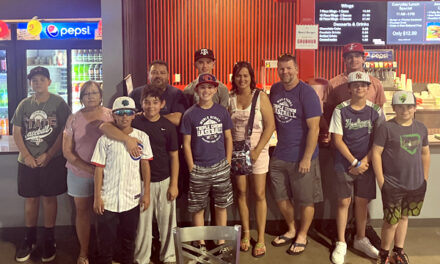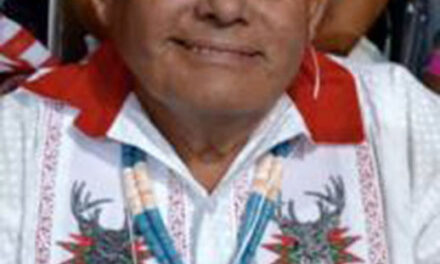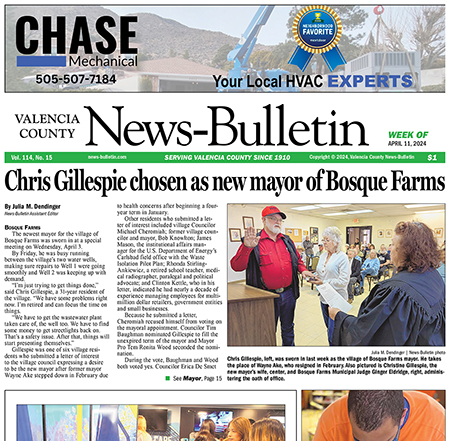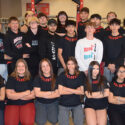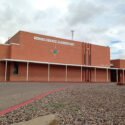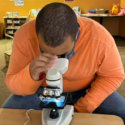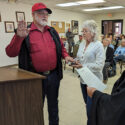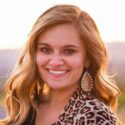PERALTA — Four horses wander through the Wilderwood property, grazing and keeping cool in the shade on a hot summer day.
Rebecca Evanko and her husband, Mark, step outside their Peralta residence to check up on Odysseys, Vivaldi, Desmond and Rae.
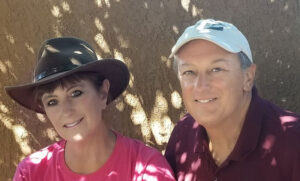
Wilderwood Therapy and Rescue caretakers Rebecca and Mark Evanko created the organization to provide resources for autistic adults through taking care of horses and learning important skills.
The Evankos are the creators of Wilderwood Equine Therapy and Rescue. Rebecca has her Ph.D in cognitive linguistics, while her husband is an osteopathic family physician.
The 501(c)3 began 2 1/2 years ago when the couple began researching different organizations who used horses for therapeutic purposes. In that search, Rebecca found most of the courses were created without the consultation of autistic people by neurotypical people, which is a term to describe the majority of the population of people who process information in one way in contrast to how autistic people process information.
“We wanted to retire and do something in our retirement that would be helpful for autistic adults because we don’t get very much of the funding,” Rebecca said.
There is an estimated 5.5 million American adults who are autistic, and two-thirds of autistic adults do not have intellectual impairment but struggle with executive functioning, self-regulation and social interaction.
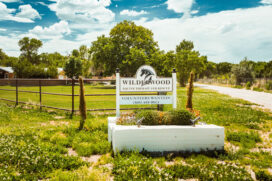
The Wilderwood Therapy and Rescue property has a home in Peralta. To learn more, visit WilderwoodEquineTherapy.org or call 505-459-9813.
Anna Padilla | News-Bulletin photos
“Many of us are college graduates, but 85 percent of us with college degrees are unemployed or under-employed,” she said. “We just see the world a little differently, and it can cause problems in the workplace, so we wanted to help.”
Rebecca grew up in Australia, and was exposed to horses at a young age. She quickly realized being around horses calmed her in a way most other things could not.
She grew up most of her life with undiagnosed autism, which, she said, caused difficulties, including being abandoned by her parents at the age of 15 and dropping out of high school.
Her move to Texas as an adult to continue her education was what eventually led her down the path to getting diagnosed with autism, and was what gave her resources to help her create a better life for herself.
An important thing to keep in mind, Rebecca said, is that autistic people prefer being called “autistics” or “autistic people” as opposed to being called an individual with autism.
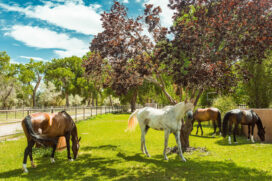
The Wilderwood Therapy and Rescue is home to four horses, Odysseus, Vivaldi, Desmond and Rae.
“The vast majority of us want to be called ‘autistics.’ Autism is not something terrible to be cured; it’s part of who we are — it’s part of our identity,” Rebecca said. “The same line of thinking applies to the phrase Autism Spectrum Disorder, we prefer to call it Autism Spectrum Discovery.”
It was in her research that Rebecca decided she had to create her own curriculum to truly serve the community of autistic adults.
Mark has been a family physician for 36 years. That, combined with Rebecca’s professional experience teaching and developing curriculum as a university faculty member for 16 years, served the pair as they embarked on writing the Wilderwood curriculum.
“It just felt like our past careers and life have come together at this point to do this thing, so we set about writing a curriculum that would help autistic adults be successful in the workplace and in their lives, as well as try to do something about this terrible depression and suicide rate and lack of independence,” Rebecca said. “Autistic adults have a whole lot to offer if they’re given the right support.”
The nine-month curriculum is comprised of 64 instructional hours that assists with building communication skills, executive functioning skills, such as paying attention, organizing and planning, self esteem and identity and career development.
Odysseus, or Odie as he’s affectionately known, was rescued from a kill pen and now lives at Wilderwood with the Evanko’s three other horses. The couple got input from psychologists, education specialists, equine specialists and educators while developing the program.
“We got input from psychologists, education specialists, equine specialists, educators, and my background is in cognitive linguistics, which is the intersection of philosophy and psychology,” Rebecca said.
Their pilot program had been scheduled to commence in March, where they would have autistic adults test the program and provide input before the official launch, but due to the COVID-19 pandemic restrictions, it had to be postponed until June.
“Everyone is masked and socially-distanced, but we’re almost through the pilot program now and have had some wonderful feedback and will be incorporating those changes into the curriculum,” Rebecca said.
“We’re just blown away that people are recognizing there’s a need for this, and they’re also recognizing the uniqueness of it because we’re getting grant funding and we haven’t even started yet.”
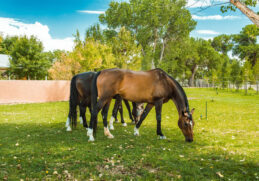
At the heart of Wilderwood Equine Therapy’s mission is to provide resources for autistic adults to get greater satisfaction from their life. Rebecca is autistic herself and is proud to have created a program “by autistics, for autistics.”
The grants they’ve received covers costs for publication of textbooks, smart watches to monitor stress levels, producing a documentary following one of the participants through the program and four full-time and one part-time scholarships for participants next year.
Wilderwood has partnered with Colorado State University and Temple Grandin Equine Center, which has focused primarily on children but hopes to direct more resources towards adults.
“They’re wanting to see our research and our results,” Rebecca said. “They’re very interested in our methods and, in turn, we have donated our entire estate to CSU. This truly is a labor of love for us.”
“Track one is looking at a lot of the basics of what the program is and taking information about the autistic so that looking back from track five to track one, there’s going to be an evaluation so that we can see what sort of progress has been made,” Mark said. “It’s the only curriculum that we’re aware of that’s designed by autistics, for autistics.”
Tracks two, three and four are focused on caring for horses, riding horses, gardening, meditation and career planning.
The pilot program is currently underway and will be completed late this summer. It was delayed due to the cornavirus but is now in full swing. Participants are taking precautions by remaining masked and remaining socially distant.
“There are many strengths that autistic adults can bring to the workforce. We can make incredibly loyal and detail-oriented employees, we just can’t do the fun activities that non-autistic people think are fun. We just don’t get it,” Rebecca said with a chuckle.
Mark said one of the pilot program participants wore a smart watch, and they monitored her stress levels before and after spending time with one of their horses, and said there was a dramatic difference.
“Her stress level went from a medium level to almost nothing just by being around a horse and doing some of the grooming exercises,” Mark said.
The couple has set up a trust board and committee to manage the organization, and both serve on it as members. Mark said they are merely the caretakers of the property and do not own anything.
“The horses will be cared for when we’re gone,” Rebecca said. “They’ll go up to Colorado State or they’ll open up a center down here.”
At the heart of Wilderwood Equine Therapy’s mission is to provide resources for autistic adults to get greater satisfaction from their life.
“My horses rescued me, and we wanted to figure out a way to use horses to help people, too,” Rebecca said.



